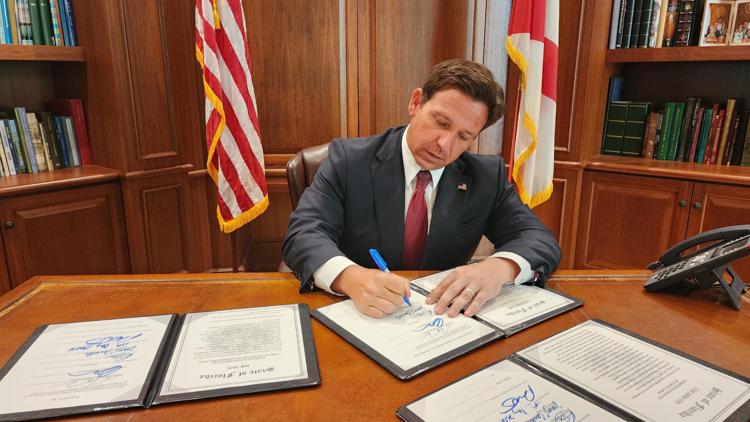TAMPA, Fla. — Gov. Ron DeSantis signed more than 20 bills this week ranging in topic from condo associations, to background checks and a few that deal with revising boundaries and districts in counties across the state.
Here are a few notable new laws that he signed that were bipartisan and will be going into effect in less than a month:
The bill voted on unanimously in the legislature incorporates concepts of supported decision-making into state law. This is a tool that allows people with disabilities to retain their decision-making capacity by choosing a person to help them make choices. The "supporter" would be in place of a court-appointed guardian or guardian advocate.
The new law amends state law in multiple ways with courts having to consider and identify alternatives to court-appointed guardians like supported decision-making. This tool will be considered a form of a power of attorney, and the new law creates a statute defining, authorizing and regulating supported decision-making agreements.
Parents will also be able to use supported decision-making to make educational decisions for their child if he or she has a disability.
It will go into effect July 1.
Another bipartisan law, this amends state statutes regarding employment screenings for homeless service professionals. It adds more requirements to background screenings for people trying to become professionals like therapists, counselors, pharmacists, dentists and many others.
This is mainly targeting people applying for these jobs with"lived experience" of homelessness. According to the bill it "creates a process for former homeless individuals to become certified as a 'person with lives experience' to provide support services to individuals who are currently experiencing homelessness."
It will go into effect July 1.
There will be new changes to condo oversight and management laws under this unanimously passed bill. The goal is to strengthen oversight of condo buildings and their boards and make them more accountable for maintenance and recordkeeping.
This builds on prior laws passed since the collapse of the Champlain Towers South building in Surfside that killed 98 people. Here are some of the details:
- Condo directors will have to go through more educational trainings
- There will be criminal penalties for condo directors or board members who violate inspection requirements, destroy or doesn't keep records, accept kickbacks and engage in fraudulent voting activities
- Associations of 10 or more units have to meet quarterly for community members to ask questions
- Building records must be online for owners to view
- Creates a uniform procedure and definition for hurricane protections
- Board members can't use condo association money for defamation lawsuits
- The Department of Business and Professional Regulation will now be able to enforce condo and condo association laws
- The bill includes about $6.1 million in recurring funds and about $1.3 million in nonrecurring funds to pay for this
- It will go into effect July 1.
The Baker Act provides a legal procedure for voluntary and involuntary mental health exams and treatment while the Marchmn Act addresses substance abuse through prevention, detoxification and treatment.
This law will make changes to the acts by combining the processes for courts to order people to involuntary outpatient services and inpatient placement.
Here are some changes to the Baker Act:
- Courts can't order a person with a developmental disability who doesn't have a co-occurring mental illness to go to a state mental health treatment facility
- Officers have discretion to initiate involuntary examinations
- The maximum time a person can be ordered into involuntary outpatient services will be six months instead of 90 days
Here are some revisions for the Marchman Act:
- Courts have to inform respondents about their right to request an independent assessment
- A court's timeframe to schedule a hearing is 10 days instead if 15
- Streamlines the involuntary treatment process for assessment, stabilization and treatment
Changes to both acts:
- Creates a more comprehensive and personalized discharge planning process
- Removes limitations on advanced practice registered nurses and physician assistants servicing the physical health or people receiving psychiatric care
- Psychiatric nurses can release patients from a facility if certain criteria are met
- Removes the 30-bed limit for crisis stabilization units
It will go into effect July 1.



